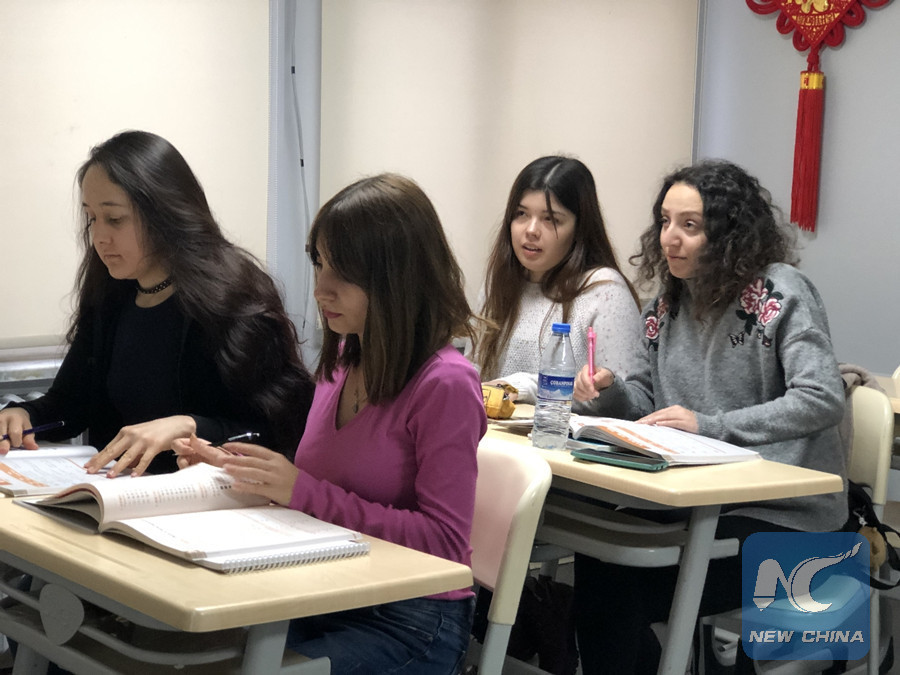
Turkish students are learning Chinese at China-Turkey Cultural Association on December 11, 2018. (Xinhua/zeynep)
ISTANBUL, Dec. 12 (Xinhua) -- Following an intensive day at their respective universities, a group of students rushed to a classroom in central Istanbul for their Chinese class, with the hope of having more options in future careers.
"We see that there are not too many Chinese-speaking people in Turkey," said Koray Saglar, a sophomore, as he was putting down his course materials on the desk.
"This creates a huge demand in the business world," he told Xinhua before the class began at the Turkish-Chinese Cultural Association. He wants to continue his studies in China on trade and commerce in the coming years.
According to Mustafa Karsli, vice president of the association, Turkish students have started to realize that learning the Chinese language is becoming an inevitable part of the business life, as China continues to expand its influence globally.
"In today's fast developing business world, English, as a secondary language, is not enough anymore," he said.
For him, the Chinese language ranks the top of the list after English, not only in Turkey but also in many parts of the world, and a growing number of university students, with future careers in their minds, are learning Chinese.
In the view of Karsli, the growing interest in the Chinese language should be seen as a very natural outcome of China's current upward trend in the international arena, in line with the progress made in the Belt and Road Initiative over the past five years.
"A large number of Chinese and Turkish companies began to send their personnel to the classes at our institution in response to the growing needs of Chinese-speaking staff," said Karsli.
Three years ago, Karsli's association launched a program called "Easy Chinese" in universities to introduce the Chinese language and culture to students.
"So far, thousands of students have attended the program which is free of charge," Karsli said, noting the attendees became more eager to study Chinese after learning about China and the language itself.
The association has currently 250 learners attending the classes, with 60 percent of them university students. During the summer months, many other students from different parts of the country joined crash courses.
Ismail Kural, a student from Marmara University, said the companies with which he has been in contact since he started to learn Chinese have begun to offer him a full-time job after his graduation.
"So I suggest to my friends to start to learn Chinese as soon as possible, as there is a huge gap in many sectors," he said.
Apart from the association, the Confucius Institutes across Istanbul have been opening Chinese courses as well to Turkish students and others.
Deniz Iscan, a high-school student aged 17, decided this year to take the Chinese course with the Confucius Institute at Bogazici University (CIBU).
"I want to learn as much as possible about China, its culture, society and the language before I start my university years," said Iscan. On graduation, she plans to live and work in the tourism industry in China as a tour guide.
The CIBU provides credit courses on the Chinese language for beginners at intermediate and advanced levels, as well as reading courses on the Chinese history, culture and society.
This year a total of 205 undergraduates have registered in the elective credit courses at the CIBU, while 84 others attend the lessons over the weekend.
"Most of them are planning to get a scholarship and go to China for intermediate studies," said Li Wenhong, the Chinese director of the CIBU.
"Other students have a long-term perspective to work or do business in China," he added.
The CIBU continues its cooperation with many universities and high schools across Istanbul to support Chinese learning by over 1,100 students, according to Li.

